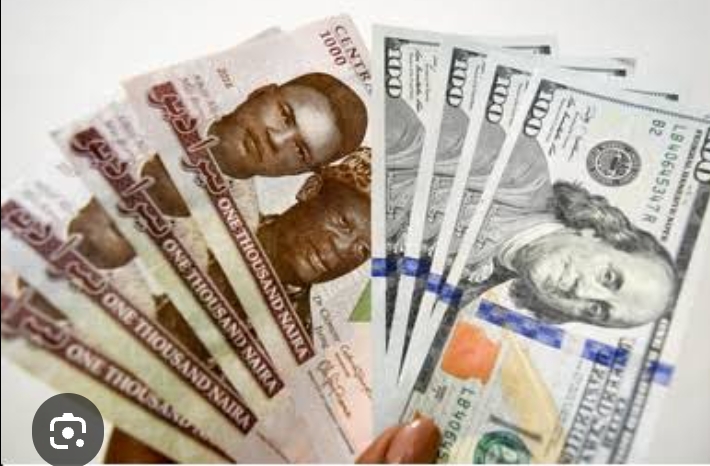News
Naira defies CBN’s forex reforms, tumbled 41% in 2024

By Kayode Sanni-Arewa
The official exchange rate between the naira and the United States dollar ended in 2024 at N1,535/$, an analysis of data from the Central Bank of Nigeria has shown.
This was a 40.9 per cent depreciation over the year when compared to the official rate at the close of 2023, which stood at N907.11/$.
The significant depreciation comes amid the CBN’s introduction of several foreign exchange policies aimed at enhancing market transparency and attracting foreign investors.
These measures included reforms such as the unification of FX windows under the Nigeria Foreign Exchange Market and the introduction of the Nigerian FX Code, which mandated ethical conduct and governance among market participants.
On the parallel market, where the naira trades unofficially, the currency exchanged at N1,660/$ at the end of 2024.
This represents a 26.8 per cent depreciation from N1,215/$ recorded at the close of 2023.
The year saw the CBN aggressively expand market-friendly policies to stabilise the FX market and attract foreign investment.
This year, the CBN announced that it had successfully cleared all valid FX backlogs, fulfilling a key commitment by Governor Olayemi Cardoso to address the inherited $7bn in outstanding claims.
In May 2024, the CBN issued revised guidelines to strengthen the operations of Bureaux de Change operators in Nigeria.
The guidelines define permissible activities for BDCs, such as sourcing foreign currency from specified entities and selling foreign exchange for purposes like Personal Travel Allowance and Business Travel Allowance.
The CBN automated foreign currency trading to replace the over-the-counter system, improving market efficiency and oversight.
Another key intervention was the direct selling of FX to BDCs at different times this year.
The apex bank also sold FX on the official market but at a minimal level.
Also, the Nigerian FX Code, introduced in October, set ethical and operational standards for market participants, with mandatory compliance deadlines by the end of 2024.
To bolster foreign reserves and reduce pressure on the naira, the apex bank initiated the Voluntary Disclosure and Repatriation Scheme, allowing individuals and businesses to deposit and invest internationally tradable foreign currencies in designated domiciliary accounts.
There was also the Nigeria Foreign Exchange Market framework, which consolidated all FX trading windows into a unified market to improve transparency and liquidity.
BDC operators were temporarily allowed direct access to buy FX from authorized dealers with a weekly cap of $25,000, a measure implemented during the festive season to meet heightened demand
Despite these interventions, the naira faced immense pressure from limited foreign exchange inflows, the widening gap between official and parallel market rates, and lingering effects of capital flight by foreign investors.
The World Bank listed the naira among the worst-performing currencies in Sub-Saharan Africa in 2024.
The depreciation of the naira is attributed to several factors, including surging demand for United States dollars in the parallel market, limited dollar inflows, and delays in foreign exchange disbursements by Nigeria’s central bank.
The World Bank’s report further highlights that demand for dollars, driven by financial institutions, non-financial end-users, and money managers, has exacerbated the pressure on the naira.
However, the International Monetary Fund has reported that the naira is showing signs of stabilisation, attributing this to recent interest rate hikes and efforts by the Central Bank of Nigeria to address foreign exchange backlogs.
President Bola Tinubu, during his budget presentation speech, said the proposed budget was based on the projections that inflation will decline from the current rate of 34.6 per cent to 15 per cent next year.
He projected that the exchange rate will improve from approximately N1,700 per US dollar to N1,500 and a base crude oil production assumption of 2.06 million barrels per day.
The President of the Association of Bureau De Change of Nigeria, Aminu Gwadebe, earlier said the N1,500/$ peg in the 2025 Appropriation Bill was within reach on the back of recent foreign exchange reforms being pushed by the CBN.
However, Fitch Ratings, a global credit rating agency, noted that a larger-than-expected budget deficit in 2025 could lead to further naira depreciation, higher inflation, and increased borrowing costs, ultimately threatening the government’s reform agenda.
News
A Chat with Janet Odio Okolo: A Mother’s Journey Raising a Child with Down Syndrome

News
Hon. Nnamchi Begins Street Lights Deployment In Isi Uzo(Photos)

Honourable Paul Sunday Nnamchi, representing Enugu East/Isi Uzo Federal Constituency in the 10th House of Representatives, has fulfilled his promise to illuminate communities in Isi Uzo Local Government Area.
The lawmaker has just begun the deployment of high-density solar-powered street lights in Ikem Nkwo, marking the beginning of a massive rollout of the street lamps across the communities in Isi Uzo.
This initiative, which started in Enugu East Local Government Area in 2024, aims to support the fight against insecurity in the state which according to him was to add to what Chief Security Officer of Enugu State Barrister Peter Mba had done to secure the state to attracts foreign investments.
The lawmaker expressed concern over banditry attacks, particularly by herdsmen, in some communities within Isi Uzo and Enugu East Local Government Areas in the recent pasts.
He believes that illuminating these areas with high-density street lights would help address the insecurity adding that he was prioritizing border and farming communities in Isi Uzo, where banditry has displaced residents and restricted farming activities.
Communities in Ikem, Eha-Amufu in Isi Uzo which borders Enugu and Benue State and Ugwogo-Nike in Enugu East have been vulnerable to these attacks due to their strategic locations.
News
May Day: Kalu Hails Workers, Applauds Their Role in Nation Building

By Gloria Ikibah
Deputy Speaker of the House of Representatives, Rep. Benjamin Kalu, has extended warm wishes to Nigerian workers as the country marks the 2025 edition of International Workers’ Day.
Kalu praised workers across various sectors for their commitment and resilience, describing them as the engine that keeps the nation moving. He acknowledged their sacrifices and unrelenting drive, especially during tough economic times.
In his message, he highlighted the efforts of the current administration under President Bola Tinubu to improve the welfare of public servants. He referenced the National Assembly’s prompt backing of the new minimum wage as a sign of the government’s seriousness about workers’ wellbeing.
The Deputy Speaker appealed for continued patience and understanding from Nigerians, noting that the ongoing economic reforms, while challenging, are designed to bring long-term relief and prosperity.
Kalu also called for unity, and said the country can only overcome its present difficulties if citizens and leaders work together in good faith.
He therefore urged workers to keep the faith and remain steadfast in their duties, assuring them that brighter days are on the horizon, and wished Nigerian workers a peaceful and fulfilling May Day celebration.
-

 Metro20 hours ago
Metro20 hours agoGunmen storm University of Benin teaching hospital, kill doctor
-

 Metro20 hours ago
Metro20 hours agoFCTA destroys 601 motorbikes over violations
-

 News12 hours ago
News12 hours agoAlleged money laundering: EFCC produces Aisha Achimugu in court
-

 News20 hours ago
News20 hours agoJust in: FG declares tomorrow public holiday
-

 News13 hours ago
News13 hours agoJUST IN: Major General Paul Ufuoma Omu Rtd, dies at 84
-

 News13 hours ago
News13 hours agoTinubu hails Dangote’s World Bank appointment
-

 News16 hours ago
News16 hours agoSAD! Professor’s son takes own life inside varsity staff quarters
-

 News20 hours ago
News20 hours agoFull list: FG approves N110bn to rehabilitate medical schools 18 institutions























